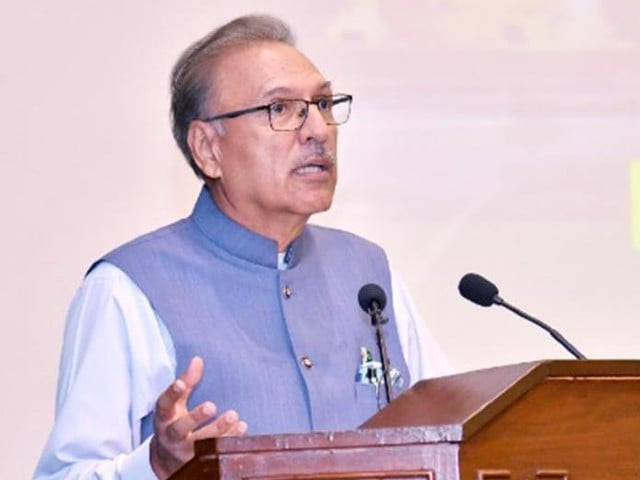When will President Alvi face impeachment?
Alvi's impeachment will be unprecedented like the success of the no-confidence motion against ousted PM Imran

The constitutional crisis induced by the political earthquake last month, whose epicentre was the National Assembly, is over. But the aftereffects continue to convey tremors down to the “Aiwan-e-Sadr” that’s bracing for upheaval.
However, the ambitious 'clean slate' that the opposition parties had sought in order to re-author the political logics to preempt any resistance to their script is facing a hitch.
In the presence of President Arif Alvi who continues to hold the office of state’s head, the government, led by a rainbow alliance, feels it is still facing ‘vestigial’ rivalry from the PTI.
Dr Alvi stayed in the shadows since the ouster of the former prime minister Imran Khan-led PTI government until he was forced into the limelight to carry out his constitutional duties to which he had excused himself from, citing illness and did not administer the oath to the newly inducted cabinet in the first phase.
Read more: President Alvi not to opt for resignation following Imran's ouster
He, however, made himself readily available to carry out his aforementioned duties in the second phase of the coalition cabinet’s induction. A move, that did not surprise many, but did instil in people the urge to ponder over whether President Alvi had a sudden change of mind or was urged to do so by the officious “corridors of power”.
The question lingering in the minds of people who have been paying close attention to the unfolding political saga is when the president will be impeached? The coalition partners have on occasions signalled the possibility of it if the PML-N-led government senses it is being hobbled by the president -- something it had to experience in Punjab where the governor stonewalled Hamza Shehbaz's election.
The impeachment of President Alvi will be unprecedented like the success of the noconfidence motion against ousted PM Imran.
No president of the Islamic Republic of Pakistan has ever been impeached to this date. Many have, however, resigned. Voluntarily or forcefully, resides only with history.
The process of impeachment
The process to impeach the president has succinctly been laid out in the Constitution but is a difficult task as it requires the votes of parliamentarians from both the Upper and Lower Houses.
According to Article 47 (1), “the President may, in accordance with the provisions of this Article, be removed from office on the ground of physical or mental incapacity or impeached on a charge of violating the Constitution or gross misconduct.”
Also read: Govt gears up for Alvi’s impeachment after Eid
For the coalition government to begin the process of impeachment, a notice of impeachment needs to be sent to the NA speaker or the Senate chairman.
It is imperative for the notice to be signed by at least one-half of the relative House ie: 50 members of the Senate or 171 members of the NA.
“Not less than one-half of the total membership of either House may give to the Speaker of the National Assembly or, as the case may be, the chairman written notice of its intention to move a resolution for the removal of, or, as the case may be, to impeach, the President,” reads out Article 47 (2).
If senators have sent the notice to the chairman, then he will forward it to the NA speaker, defines Article 47 (3).
Once the speaker receives the impeachment notice, he is bound by Article 47 (4), to send a copy of the notice to the President.
Now the following actions dictated by Article 47 (5), clearly state that it is mandatory for the speaker to summon a session of the both the Houses “to meet in a joint sitting not earlier than seven days and not later than fourteen days after the receipt of the notice by him.”
According to Article 47 (6), “The joint sitting may investigate or cause to be investigated the ground or the charge upon which the notice is founded.”
The power of Article 47 (7) gives President Arif Alvi every right to attend the joint sitting debate or investigation.
In agreement with Article 47(8), if a resolution is passed by two-thirds of the combined majority of the both the Houses (Senate and NA), then “the President shall cease to hold office immediately on the passing of the resolution.”
The Senate has a total number of 100 seats whereas the National Assembly has 342. Two-thirds of 442 which is 296 (votes) will be needed to impeach the President.
Currently, the Senate has a full membership with 100 sitting senators but the NA has 174 sitting MNAs while 135 belonging to PTI have tendered their resignations which are yet to be accepted.



















COMMENTS
Comments are moderated and generally will be posted if they are on-topic and not abusive.
For more information, please see our Comments FAQ